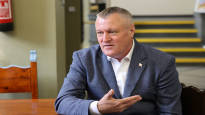– I couldn’t believe what was happening around me – that I was free. This feeling continued for several days, describes the Belarusian human rights activist Leanid Sudalenka release from the labor camp at the end of August.
He was in prison for two and a half years. Sudalenka says that after her release, she was like a fish on dry land, because she could no longer do normal things such as call on the phone or go to the store.
The 57-year-old lawyer received a three-year prison sentence in 2021 for activities against the administration. Sudalenka had provided legal assistance to dozens of residents of the Homel region who had been arrested and accused of participating in protests following the 2020 presidential election.
Several human rights organizations considered the sentence political and appealed For the release of Sudalenka.
Sudalenka’s wife was waiting at the prison gate and his 15-year-old son was waiting at home, whom he had never seen during his time in prison. The boy had grown to his father’s height.
– I promised them that I would come back and I kept my promise, says Sudalenko and gets moved when talking about the family.
Sudalenka visited Finland at the freedom of speech event in Tampere this week. He still works for the Belarusian human rights organization Viasna. The founder of the organization, in prison Ales Byalyatsky was one of the recipients of the Nobel Peace Prize last year.
Sudalenka wants to talk about prison conditions, because there are still so many innocent people imprisoned in Belarus.
Belarus has Viasnan according to almost 1,500 people imprisoned for political reasons. of the EU including after summer 2020 the president Alexander Lukashenko the administration arrested 40,000 people on political grounds and has tried 12,000 people.
OSCE according to the May human rights report, political prisoners in Belarus are treated badly and have even become victims of torture.
The EU has condemned the Lukashenko administration’s involvement in Russia’s attack on Ukraine and imposed sanctions against Belarus. Britain, the EU and the United States do not recognize Alyaksandr Lukashenko is legally the president of the country.
Sudalenka’s nightmare began three years ago
According to Sudalenka, the judge who sentenced him was young, no more than 30 years old. He asked Sudalenka if she understood the sentence.
– I told him out loud that I understand that you have agreed with your conscience, but I don’t understand how you can agree with the law, because the law was on my side.
At a higher court level, the defense was prevented from advancing evidence, so the verdict was upheld and Sudalenka was taken to a prison camp.
The prisoner died due to the negligence of the doctors
In the camp, the prisoners were divided into political prisoners and prisoners who had committed crimes. The administration prevents political prisoners from giving information to their relatives and limits their correspondence.
– For example, during the year and a half that I was in the camp, I could not receive letters. I wrote them, but the censor didn’t let them through, says Sudalenka.
He was allowed to make calls four times a month and they could last ten minutes. Certain topics were forbidden, for example the war in Ukraine or the politics of Belarus. In the evenings, the prisoners were allowed to watch two regime propaganda channels for an hour.
According to Sudalenka, there was enough food, but it was not nutritious. He also never received his medicines sent from home. He says that the prison doctors gave him medicine for diabetes, but he could not measure his blood sugar levels in prison.
According to Sudalenka, one man in his thirties died in the prison, because he was not cared for properly.
– He just went to sleep at night and didn’t wake up in the morning.
Sudalenka says that he contracted the corona virus during his time in prison.
– I was thrown into an isolation cell with six square meters, and I was there alone for 20 days. I was only given three meals a day and one course of antibiotics, he says.
– I realized that if I had needed a ventilator, that would have been my fate.
Work in dangerous conditions
The Sudalenka prison camp had wood and metal dismantling workshops nearby, where the prisoners worked without protective gloves. Not even the eyes were protected.
– It was very heavy manual work. Somewhere it had been determined how many kilos had to be made in an eight-hour shift. I often got wounds on my hands, says Sudalenka.
The most distressing thing about Sudalenka at the camp was the unpredictability. The prisoners didn’t know how to get extra punishment for everything. According to Sudalenka, he was troubled by the fear of new accusations and there was stress all the time.
– Of course, it doesn’t disappear without a trace, and it’s very bad for your health. And I don’t think I’ll ever be able to forget it.
He describes being released to a different kind of prison. In Belarus, prisoners’ homes can be inspected daily even after release.
– They came to my house twice a day pretending to be a registrar, and I signed that I was at home. For example, to leave the city of Homel, I had to get permission from the police. Without their permission I could not leave.
Sudalenka understood that it was easy to pick him back up in prison. He decided to flee the country and continue his work as a human rights activist in Lithuania. The wife and son still remained in Belarus. According to the wife, it is better for the man to be on the other side of the border than in prison, Sudalenka says.
Sudalenka would still like to return to Belarus and believes that many Belarusians who have fled want the same.
